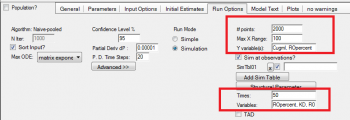Q: The assumption here is target/receptor is present in central compartment. What if the target is in peripheral tissue (e.g. tumor in xenograft)?
A: Although the commonly used TMDD models assume binding in central compartment, they may be good enough to accurately describe the data in the case you mentioned. In some publications, the TMDD models have been extended to describe the target binding in both central AND peripheral compartments. For an overview, please see section “Binding in the tissue compartment” in Dua P, Hawkins E, van der Graaf PH. A Tutorial on Target-Mediated Drug Disposition (TMDD) CPT Pharmacometrics Syst Pharmacol. 2015 Jun;4(6):324-37.
Q: If the antibody binds to both membrane receptor and soluble receptor (shed from membrane), how to use Phoenix to execute the model, will there be a webinar for that?
A: There is currently no specific webinar planned for this. This publication may be helpful: Gibiansky L, Gibiansky E. Target-mediated drug disposition model for drugs that bind to more than one target. J Pharmacokinet Pharmacodyn. 2010 Aug;37(4):323-46. Notice that this paper was also cited in the section “Multiple targets” in Dua P, Hawkins E, van der Graaf PH. A Tutorial on Target-Mediated Drug Disposition (TMDD) CPT Pharmacometrics Syst Pharmacol. 2015 Jun;4(6):324-37.
Q: When you do the simulation, do you simulate at a single time point by putting time there?
A: In this hypothetical example, we indeed simulated Receptor Occupancy only at Time point 50. This was just an example. Onecan also simulate Receptor Occupancy over multiple time points as desired, for example, putting seq(0,200,1) will give you Receptor Occupancy from 0 to 200 with step size 1.
Q: Are the PK and RO always simultaneously fit in TMDD modeling?
A: For TMDD models, simultaneous fitting PK and RO is more appropriate as the drug-receptor interaction alters the drug PK profile.
Q: How to model a bispecific Ab?
A: If this question refers to TMDD modeling of bispecific mAbs, then the poster by Johannes Schropp and Gilbert Koch at PAGE 2017 may be helpful, and itcan be downloaded from https://www.page-mee...p?abstract=7169.
Furthermore, this publication may be helpful:
Gibiansky L, Gibiansky E. Target-mediated drug disposition model for drugs that bind to more than one target. J Pharmacokinet Pharmacodyn. 2010 Aug;37(4):323-46.
More generally speaking, as always, different models should be explored and evaluated as different bispecific mAb may require different model to appropriately describe its dynamics.














